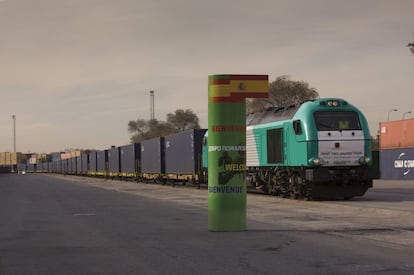China-Madrid train route making slow progress
Longest rail service in the world brings tons of Chinese goods to Spain, but returns half empty

Senior Chinese trade officials were in Madrid this week in a bid to revive the flagging fortunes of a 13,000-kilometer rail route linking the Spanish capital with the Chinese city of Yiwu, more than a year after it opened amid much fanfare.
Since the first train arrived in the Spanish capital in December 2014 following a deal signed by Spanish Prime Minister Mariano Rajoy and his Chinese counterpart Xi Jinping, a further 39 convoys have unloaded Chinese imports, while just eight have returned bearing Spanish exports, the most recent of which began its journey through France, Germany, Poland, Belarus, Russia, Kazakhstan to Yiwu, in China’s central Zhejiang province, this week.
Rail transport is faster than sea routes but is also significantly more expensive
Rail transport is faster than sea routes – taking 21 days as opposed to up to 40 by container vessel – but is also significantly more expensive. A container aboard the Yiwu Express costs €2,000, while one stored on a ship costs €1,300. The difference in cost has clearly been a factor that has discouraged Spanish exporters, as have bureaucratic problems. Mao Wenjin, president of the Yiwu-Spain trade association, explains: “A number of legal issues such as permits to export ham, and the movement of foodstuffs through Russia need to be sorted out.”
Santiago Vivanco, head of the Vivanco winery, says his firm has exported red wine three times using the Yiwu Express. He says it is worth the expense, as it avoids customs duties and delays at the port of Shanghai. “I think the reason Spanish exporters aren’t using it is because there isn’t much tradition of transporting goods by rail in Spain.” Other wagons are filled up further along the route in northern European countries such as Germany, which makes the service viable, he explains.
The train brings in a wide range of Chinese-made goods, from Christmas decorations to Tupperware. In return, Spanish manufacturers mainly export ham, wine, olive oil, and mineral water. Jaime García-Legaz, Spain’s secretary of state for trade, believes the train route would be of particular interest to producers of fruit and vegetables, which keep well in cold storage. He believes the project is holding its own and that it is normal for the volume of trade to be greater coming in from China, given the size of its manufacturing sector compared to Spain’s.
A number of legal issues such as permits to export ham and the movement of foodstuffs through Russia need to be sorted out Mao Wenjin, president of the Yiwu-Spain trade association
Sheng Quiping, a senior Communist Party representative from Yiwu, said in Madrid this week that he believed that despite the economic slowdown in his country, there was still demand for Spanish goods. “In the next five years we are going to promote imports. Spanish goods are very popular,” he said.
Yiwu is a huge distribution center for central China, filled with thousands of wholesalers. Mao said that if you spent eight hours a day visiting its stores, taking just three minutes in each, it would take more than a year to enter each one. The city has a GDP equivalent to 8% of Portugal’s, and it is visited by around 10 million buyers each year.
Spain is aware of the need to raise awareness of the Yiwu Express, and the country’s ICEX foreign trade institute regularly organizes seminars for business leaders and exporters. “We have supported the Yiwu-Madrid route from the outset and believe that Spanish exporters will start using it more,” says ICEX CEO Francisco Javier Garzón.
The Hermanos Rubio winery is among the 15 Spanish companies that have used the train, sending two shipments of red wine to China. The first was in winter, requiring the use of thermal blankets to protect the bottles from the Russian cold. But as spring approaches, such measures are no longer necessary. “I saw it on the television, but it was our customer who asked us to use this means of transport,” he said.
His client was Mao, who owns a company that distributes Spanish goods in China. “It’s true that it is pricey, but this train is a priority for the Chinese government. If we use this train, the government gives us free advertising on state television.”
Tu suscripción se está usando en otro dispositivo
¿Quieres añadir otro usuario a tu suscripción?
Si continúas leyendo en este dispositivo, no se podrá leer en el otro.
FlechaTu suscripción se está usando en otro dispositivo y solo puedes acceder a EL PAÍS desde un dispositivo a la vez.
Si quieres compartir tu cuenta, cambia tu suscripción a la modalidad Premium, así podrás añadir otro usuario. Cada uno accederá con su propia cuenta de email, lo que os permitirá personalizar vuestra experiencia en EL PAÍS.
¿Tienes una suscripción de empresa? Accede aquí para contratar más cuentas.
En el caso de no saber quién está usando tu cuenta, te recomendamos cambiar tu contraseña aquí.
Si decides continuar compartiendo tu cuenta, este mensaje se mostrará en tu dispositivo y en el de la otra persona que está usando tu cuenta de forma indefinida, afectando a tu experiencia de lectura. Puedes consultar aquí los términos y condiciones de la suscripción digital.









































